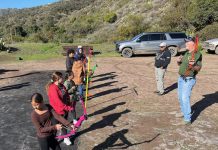Avalon officials are trying to get a face-to-face meeting with Department of Motor Vehicle representatives on behalf of Islanders whose license plates were confiscated by the state agency in September.
Avalon officials are trying to get a face-to-face meeting with Department of Motor Vehicle representatives on behalf of Islanders whose license plates were confiscated by the state agency in September.
City Attorney Scott Campbell said he has received authorization from interested residents to speak with the DMV about license plates that were confiscated from owners of grey market mini-trucks.
Campbell said that city staff was trying to get face-to-face meetings with the DMV as quickly as possible, but the meetings would be based on the availability of DMV personnel.
Campbell said no meeting had been set yet.
Islanders now must wait 20 years to bring full-sized cars to the tiny Island of Catalina. Avalon allows one golf cart per house, but the golf carts may only be driven within the city limits and then only with a city-issued permit.
Some Islanders use grey market “Kei” mini-trucks, which are useful work trucks and meet the city’s definition of “autoettes” or mini-cars. The Kei trucks also meet the Catalina Island Conservancy’s rules for vehicles that are allowed to drive in the interior of the Island.
Unfortunately, the Kei trucks don’t meet the DMV’s standards, as 12 Island residents learned last September. On Sept. 11, a DMV inspector looked at the 12 trucks. The owners were told to bring the trucks to the Los Angeles Sheriff’s Department’s Avalon Station.
“Myself and another deputy were present during several of the inspections,” said Lt. Doug Fetteroll at the time.
“As a result of the inspections, the DMV placed ‘stop registrations’ and removed license plates from the vehicles. We recognize the hardship of the owners of the affected mini-trucks and will use our discretion in enforcing the Vehicle Code while this matter gets resolved,” said Fetteroll, who is acting commander of the station.
The mini-trucks apparently came to the DMV’s attention in January of 2012. According to agency spokesperson Jessica Gonzalez, at that time Avalon Deputy Gary Phflaer told a DMV investigator that he had seen a rise in the number of Kei trucks in Avalon. Gonzalez said Phflaer wasn’t sure if the vehicle were legal and asked the DMV investigator to assist him.
Gonzalez said that in June, the DMV investigator returned to the Island.
“During that time, about 12 such vehicles were located and investigators recorded the plate numbers so they could order registration histories on them.” she said. “While visually inspecting the vehicles, investigators noted that all of the vehicles had ‘right hand drives,’ no VIN plates in the windshields and they all had Japanese writing on the bodies. When the vehicle histories were received, it was noted that many of the vehicles were sold to the current owners by the same individual and that many of the vehicle verifications had been completed by a registration service or vehicle verifier.”
The Technical Compliance Section of the Registration Processing Unit of the American Association of Motor Vehicle Administrators told the California DMV that the Kei style of autoettes did not meet California roadway standards. The association represents state and provincial agencies that enforce motor vehicle laws in the US and Canada.
Gonzalez said that investigators don’t believe the Catalina Kei trucks conform to what the DMV requires.
According to Gonzalez, the mini-trucks are not certified by their manufacturer as meeting Environmental Protection Agency standards. Only mini-trucks that are more than 21 years old may be imported to the US as on-road vehicles.
As a result of the investigation, the DMV seized the license plates of the 12 mini-trucks.
Last year, the Avalon City Council authorized City Attorney Campbell to speak with the DMV on behalf of the owners of the confiscated plates.
The DMV said it would only allow the city attorney to represent those individuals who consented to being represented.










